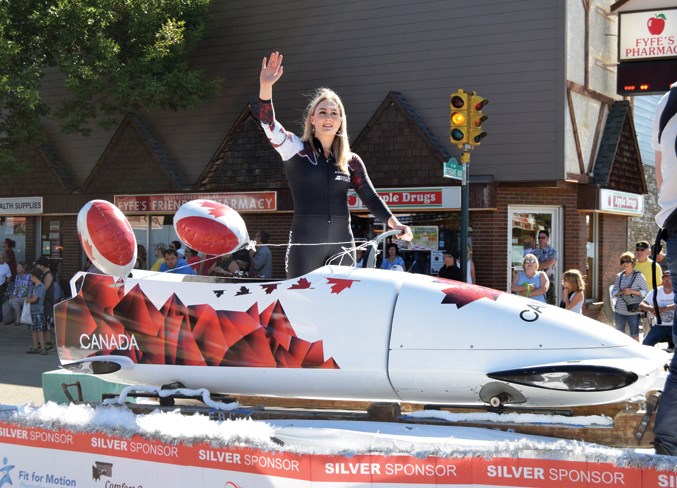For the last four years, Melissa Lotholz has devoted a large part of her life to the pursuit of making a bobsleigh go faster.
It is something she has become very good at, as evidenced by her 17 World Cup medals, including two World Championship silver medals and a seventh-place finish at the 2018 PyeongChang Olympics.
However, the 25-year-old Barrhead native has decided to make the jump from being a brakeman to the pilot’s seat at the front of the sled.
It isn’t a decision she is making lightly; Lotholz said she only decided to make the change after multiple discussions with her coaches, as well as a lot of soul searching.
“This year is all about learning,” she said, in a call from Calgary’s Olympic Park (COP) where she has been since July. “Not only am I going to be learning to drive, but I have decided to take a couple of courses online.”
Lotholz, if she were to attend convensional classes is about one-year away from getting her nutrition and food science degree at the University of Alberta (U of A).
She put her education on hold when she joined Canadian Bobsleigh Team in 2014, transitioning from the U of A track team where she specialized in the 60 and 100-metre distances.
One of the factors Lotholz had to take into consideration before deciding to make the transition into the front seat is financing.
As a Canadian athlete on the World Cup circuit, which takes place mostly in Europe, it is actually less of a financial strain on athletes to compete than those on the developmental circuits.
Lotholz’s goal is to earn a spot as a pilot on Canada’s NextGen team.
“It was definitely something I had to consider before making the decision to become a pilot,” she said, adding that the transition is more feasible because of recent changes in the way the Department of Canadian Heritage’s Sports Canada funds amateur sports federations, funnelling more money into developing the next generation of elite athletes .
Lotholz added that if it were not for emotional and financial support from friends and family, she wouldn’t be in the position to take on this new challenge.
“I am so fortunate to come from a community like Barrhead. They have given me so much support throughout my journey, I can’t tell you how much that has meant not only financially, but emotionally. It is because of the people of Barrhead that I have been able to achieve what I have.”
Besides the financial and travel differences, the eight-race developmental circuit takes place entirely in North America, so her training routine hasn’t changed that much as of yet.
“Your job first and foremost is to push the sled, the driving component then you add the driving component to that,” Lotholz said, noting she isn’t totally new to piloting a sled.
After taking a short vacation after the Olympics, she enrolled in a three-week bobsleigh driving school in Lake Placid, New York.
“It was put on by our international federation [International Bobsleigh and Skelton Federation] and there were athletes from all over the world,” she said, adding her experience on the World Cup circuit will help ease the transition.
In addition to being familiar with all the tracks in the world just by the sheer fact that she has been on them, Lotholz said she was also privy to much of the preparation by Canada’s top pilot, Kaillie Humphries.
“There is a general program that we would do before we started our training runs on every World Cup track,” she said, adding the process would start with a track walk.
That process involved athletes literally walking the track, followed by coaches and pilots planning what would produce the quickest run.
“We would then memorize the sequence, because when you are travelling down the track at speeds reaching 130 kilometres an hour, you can’t just be reacting to everything,” she said.
Lotholz is also excited about the possibility of competing in a new women’s bobsleigh event: the monobob, or one person bobsleigh.
In 2016, in Lake Placid, Lotholz had the opportunity to join Humphries in being the first women’s team to compete in the World Cup event in an attempt to convince the International Olympic Committee (IOC) to add a women’s four-person category.
Although Lotholz is disappointed that the IOC didn’t add the event, she said that adding monobob will give women bobsleighers another avenue to compete, and for her, another opportunity to improve her piloting skills.
“In terms of logistics, [the Canadian national team] are still trying to figure things out, but the sleds are very similar to the ones we use in the two-person event. They are about the same size, the only real difference is the controls because the driver is also the brakeman,” she said, adding the Lake Placid piloting school used monobobs.
“It gives you the opportunity to learn, without the responsibility of that second person and it just optimizes the amount of driving time.”
Lotholz noted that just because she will now be spending the majority of her time training to be a pilot on the development circuit, that doesn’t necessarily mean she won’t be called upon to serve as brakeman on one of Canada’s three sleds.
“World championships are in Whistler this year and that gives us a unique opportunity to really do some damage in our backyard,” she said.
As for what is next for Lotholz, she said the team is currently training at COP’s Ice House in preparation for the push testing camp in early October. After that, it will be up to the coaches.
“I’m just excited to be able to take on this new challenge. Bobsleigh has allowed me to carve out a different path and helped push me and grow as a person. I can’t wait to see how this new challenge will take me and how it will help me develop and grow in a new way,” she said.



